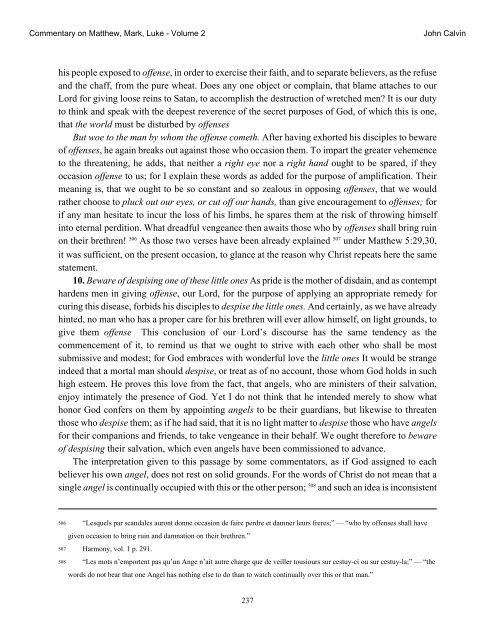Commentary on Matthew, Mark, Luke - Volume 2.pdf
Commentary on Matthew, Mark, Luke - Volume 2.pdf
Commentary on Matthew, Mark, Luke - Volume 2.pdf
You also want an ePaper? Increase the reach of your titles
YUMPU automatically turns print PDFs into web optimized ePapers that Google loves.
<str<strong>on</strong>g>Commentary</str<strong>on</strong>g> <strong>on</strong> <strong>Matthew</strong>, <strong>Mark</strong>, <strong>Luke</strong> - <strong>Volume</strong> 2<br />
his people exposed to offense, in order to exercise their faith, and to separate believers, as the refuse<br />
and the chaff, from the pure wheat. Does any <strong>on</strong>e object or complain, that blame attaches to our<br />
Lord for giving loose reins to Satan, to accomplish the destructi<strong>on</strong> of wretched men? It is our duty<br />
to think and speak with the deepest reverence of the secret purposes of God, of which this is <strong>on</strong>e,<br />
that the world must be disturbed by offenses<br />
But woe to the man by whom the offense cometh. After having exhorted his disciples to beware<br />
of offenses, he again breaks out against those who occasi<strong>on</strong> them. To impart the greater vehemence<br />
to the threatening, he adds, that neither a right eye nor a right hand ought to be spared, if they<br />
occasi<strong>on</strong> offense to us; for I explain these words as added for the purpose of amplificati<strong>on</strong>. Their<br />
meaning is, that we ought to be so c<strong>on</strong>stant and so zealous in opposing offenses, that we would<br />
rather choose to pluck out our eyes, or cut off our hands, than give encouragement to offenses; for<br />
if any man hesitate to incur the loss of his limbs, he spares them at the risk of throwing himself<br />
into eternal perditi<strong>on</strong>. What dreadful vengeance then awaits those who by offenses shall bring ruin<br />
<strong>on</strong> their brethren! 506 As those two verses have been already explained 507 under <strong>Matthew</strong> 5:29,30,<br />
it was sufficient, <strong>on</strong> the present occasi<strong>on</strong>, to glance at the reas<strong>on</strong> why Christ repeats here the same<br />
statement.<br />
10. Beware of despising <strong>on</strong>e of these little <strong>on</strong>es As pride is the mother of disdain, and as c<strong>on</strong>tempt<br />
hardens men in giving offense, our Lord, for the purpose of applying an appropriate remedy for<br />
curing this disease, forbids his disciples to despise the little <strong>on</strong>es. And certainly, as we have already<br />
hinted, no man who has a proper care for his brethren will ever allow himself, <strong>on</strong> light grounds, to<br />
give them offense This c<strong>on</strong>clusi<strong>on</strong> of our Lord’s discourse has the same tendency as the<br />
commencement of it, to remind us that we ought to strive with each other who shall be most<br />
submissive and modest; for God embraces with w<strong>on</strong>derful love the little <strong>on</strong>es It would be strange<br />
indeed that a mortal man should despise, or treat as of no account, those whom God holds in such<br />
high esteem. He proves this love from the fact, that angels, who are ministers of their salvati<strong>on</strong>,<br />
enjoy intimately the presence of God. Yet I do not think that he intended merely to show what<br />
h<strong>on</strong>or God c<strong>on</strong>fers <strong>on</strong> them by appointing angels to be their guardians, but likewise to threaten<br />
those who despise them; as if he had said, that it is no light matter to despise those who have angels<br />
for their compani<strong>on</strong>s and friends, to take vengeance in their behalf. We ought therefore to beware<br />
of despising their salvati<strong>on</strong>, which even angels have been commissi<strong>on</strong>ed to advance.<br />
The interpretati<strong>on</strong> given to this passage by some commentators, as if God assigned to each<br />
believer his own angel, does not rest <strong>on</strong> solid grounds. For the words of Christ do not mean that a<br />
single angel is c<strong>on</strong>tinually occupied with this or the other pers<strong>on</strong>; 508 and such an idea is inc<strong>on</strong>sistent<br />
506 “Lesquels par scandales aur<strong>on</strong>t d<strong>on</strong>ne occasi<strong>on</strong> de faire perdre et damner leurs freres;” — “who by offenses shall have<br />
given occasi<strong>on</strong> to bring ruin and damnati<strong>on</strong> <strong>on</strong> their brethren.”<br />
507 Harm<strong>on</strong>y, vol. 1 p. 291.<br />
508 “Les mots n’emportent pas qu’un Ange n’ait autre charge que de veiller tousiours sur cestuy-ci ou sur cestuy-la;” — “the<br />
words do not bear that <strong>on</strong>e Angel has nothing else to do than to watch c<strong>on</strong>tinually over this or that man.”<br />
237<br />
John Calvin

















